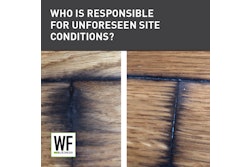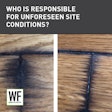Most business owners these days use the Internet as part of their marketing program—and hardwood flooring professionals are no different. Even the most basic site has contact information and a bit of background on the products and services you provide. In the advertising and marketing world, content—the photos and words that sell your services—is king. The question arises, though, “Whose content?”
The terms “copyright” and “plagiarism” that you perhaps heard of in high school exist in the real world, too, and punishment is more costly than a big letter “F” on your essay. Wood flooring businesses that populate their website or brochures with content taken from someone else stand to lose big money. Small law firms are building burgeoning practices that do nothing but send threatening letters to businesses demanding payment for copyright infractions under threat of a lawsuit.
Why? When someone creates an original work, they automatically own the right to control who gets to use that work and for what purpose. In its most basic essence, that is what a copyright is—the right to prevent others from copying your original work that you created. Note that this is automatic; while the creator can register the work with the federal copyright office to have additional rights and remedies, registration is not a requirement for the copyright to exist.
Where could copyright affect flooring business owners? Let’s look at some examples.
Photos and Brochures
You are a great installer or you have great products, and you want people to know this. So you create a website, but that means you need photos. Where do you get them?
The worst place to get them is from an images search on Google. Google indexes millions, perhaps even billions of images, but the fact that you can see them does not mean that you can use them. Unless the image is considered “public domain” it generally belongs to someone and you have to get permission to use it. While you could contact the owners of that website to ask for permission to use the photograph, the owners of the website may not actually own the rights! They may have taken the image from someone else, or they may have purchased a license that allows only them to use the image.
What about stock photos? Stock photos are somewhat generic photos taken by a photographer for the express purpose of reselling them for use by others. Again, just because you see it out on the Internet doesn’t mean it’s available for you to use. There are sites that sell stock photos for use, and that may be a good source for photo content for your website. But realize that when those photos are sold, it usually is not an unlimited right that is sold, but instead is a “limited license” that spells out requirements for your use of the photo, such as how long you can use it for, if you can redistribute it and in how many locations you can use it.
Manufacturer & Distributor Photos
OK, you say, but I’m using photos from a brochure that my distributor or manufacturer sent me. They gave me this brochure and I’m just using it to promote their product, so it should be no problem, right? Not necessarily. Product photography is typically shot by a professional photographer. What makes a photographer a professional is their ability to control lighting and to create a setting that shows the product at its best. The distributor may have hundreds of physical brochures that the manufacturer gave them to hand out; that does not mean that the distributor has the right to the images themselves, or to give the right to others to use them. It depends on the relationship between the manufacturer and the photographer.
When the manufacturer owns exclusive control, it is generally because the manufacturer hired the photographer and the resulting pictures are “work for hire,” meaning that they are owned by the manufacturer, not the photographer. But the only way to know is to see the contract between the two. Plus, when you are dealing with a photograph of a manufacturer’s product, you have two rights in play—one for the design of the photo and the other for the product in the photo.
Articles, Advertising, Reviews
The same issue applies to articles, whether in a physical magazine, newspaper or book, or on a website, and to advertising descriptions of products and reviews. If you repost all or substantially all of a website article on your website, you have violated the rights of the author or publisher unless you obtained permission. [Note from the editors: This applies to articles from HF, which we find illegally copied onto other companies’ websites on a regular basis.] The same applies to advertising descriptions of products.
Copyright Penalties
If it is discovered, usually you will get a letter demanding you to stop using it—what’s known as a “cease and desist” letter. If you comply with that, and you didn’t know the content wasn’t yours to use, then you may not have much exposure. That said, copyright violations can carry stiff penalties under federal law, and a willful violation (e.g., continuing to use the image after receiving a cease and desist letter) can lead to claims for up to $150,000 per violation, plus attorneys’ fees and costs.
How Can I Protect Myself?
The best way to avoid a copyright violation is to create your own content. Of course that is not always practical. If you need to use someone else’s content, make sure you have permission. That may mean buying the copyright in its entirety, hiring the person creating the content under a “work for hire” contract where you own all rights to the finished product, or buying some limited license. If you do buy the content under a license, make sure you know the limitations on that license so your use won’t violate the terms.
If you rely on someone else, like a web developer, to create your website content for you, make sure you get a written agreement from them that they will not use anyone else’s content without permission and without advising you first. If they are going to use stock photos, make sure they bought a license for your use, and have them provide you with a copy of that license. If you get a license, keep a copy where you can find it in case you are ever challenged, so you can prove your right to use the material.
Of course these are just general guidelines. Your particular circumstances may vary, and even if you get a license you may not understand its limitations. If you aren’t absolutely sure, you run the risk of finding out later that your understanding of your rights was faulty. With that in mind, when in doubt, it helps to consult a lawyer, who may guide you as to your best course of action.

































